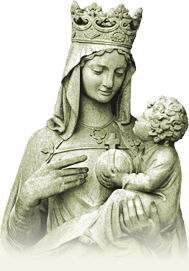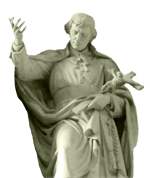Church
Christ is reassuring and humble, as well as powerful, mighty
Bishop Robert Vasa, Catholic Sentinel, Portland, Oregon, Published by Oregon Catholic Press
|
02/17/2006
|

BEND — We live in an age which places a very strong emphasis on tolerance, mutuality, and acceptance. I have heard repeatedly over the years that “Jesus never judged, condemned or excluded anyone.” I wonder if Peter would agree as the words of Jesus, “Get behind me you Satan,” rang in his ears. I wonder if the Scribes and the Pharisees would agree as they rankled at being called whitened sepulchers or broods of vipers. I wonder if those who heard Jesus say, “Whoever leads one of these little ones astray, it would be better if he had a millstone tied around his neck and be cast into the sea,” nodded approval and said, “He is so tolerant and accepting.” This verse is included, virtually verbatim, in each of the three Synoptic Gospels, Matthew, Mark and Luke. I certainly have no qualms about the image of Jesus as kind and gentle, or with Jesus’ own description of Himself as “meek and humble of heart.” I see and appreciate the great appeal of one of the most recent devotions fostered so powerfully by our late Holy Father, Pope John Paul II, that of Divine Mercy. Each of these attractive and reassuring aspects of Jesus needs to be remembered. These are aspects of Jesus that we cannot afford to forget and to which we can and must cling. At the same time we do well not to forget that the Lord is also a “God of power and might.” Jesus stood up to the guards who came to arrest him in the Garden of Gethsemane. He stood courageously before Pilate. He bore His cross with noble, unflinching determination. He is not a God of weakness. He is strong and He defends His people. This accounts for the strong language used when the “little ones” of His flock are put at risk. In our “compromising age” we are loath to name something too strongly. If we do, we are accused of harshness, judgmentalism, perhaps arrogance, certainly intolerance and possibly pharisaism. While it is always necessary to speak the truth with love, the Church also believes and teaches that it is also necessary to speak the truth with strength. It is necessary to defend truth and not be too quick to rationalize, justify or excuse misleading teachings or teachers. There is a point at which passive “tolerance” allows misleading teachings to be spread and propagated, thus confusing or even misleading the faithful about the truths of the Church. There is a very strong word, which still exists in our Church, which most of us are too “gentle” to use. The word is “heresy.” We perhaps think that heresy is a thing of the past. We think perhaps of the Arian heresy or the Pelagian heresy or the Manichaen heresy. We might even maintain that there are no longer any heretics because that conjures up images of inquisitions and burnings at the stake. I do not, in any way, seek to validate or justify any kind of “vigilante” theology, but we do need strong words to combat erroneous and fallacious teaching. As a point of information, the present Code of Canon Law does include a couple of canons on heresy. Canon 751 defines heresy as “the obstinate denial or obstinate doubt, after the reception of baptism, of some truth which is to be believed by divine and Catholic faith. . . .” There are a number of teachings of the Church that must “be believed by divine and Catholic faith.” We must believe, for instance, that Jesus is true God and true man. To deny or doubt this, with obstinacy, is heresy. We must believe the God exists in Trinity, Father, Son and Holy Spirit. We must believe that Jesus rose from the dead. We must believe that He ascended into heaven. These phrases will all be familiar because they constitute the Creed that we recite each Sunday. It may come as a bit of a shock, but there are a number of Catholic theologians who now seriously call into question these basic teachings, these Creedal tenets. There are also moral teachings that constitute a part of the deposit of faith that must be accepted and adhered to, “firmly embraced and retained.” Canon 750 concludes: “therefore, one who rejects those propositions which are to be held definitively is opposed to the doctrine of the Catholic Church.” It is certainly necessary to exercise a great deal of caution and care in arriving at a founded conclusion that someone accepts or teaches heresy. There is something terribly harsh about calling a person a heretic. This is not something that is ever done lightly or capriciously. Nevertheless, there are those of the household of Faith who obstinately deny some truth that is to be believed by divine and Catholic faith. There is some question, for instance, about whether those who openly profess to be “pro-choice” are, in fact, holding to a heretical position. The teaching of the Church in the area of life is clear and unequivocal. Human life must be respected and protected from conception to natural death. Those who maintain that any and all decisions about the disposition of pre-born human beings are exclusively the right of the mother or the parents, at least implicitly, reject the clear and consistent teaching of the Church. The truth is that God charges each of us with the duty to protect and defend innocent human life. This is clearly stated in the Fifth Commandment: Thou shalt not kill. In our society, this attempt to protect innocent human life is done through legal legislative processes and is accomplished, or fails to be accomplished, by those whom we elect. It would not be proper to imply that anyone who votes for an anti-life politician is denying some truth of divine and Catholic faith. Yet, if that candidate receives the vote precisely because he maintains that he has no duty to protect or defend innocent human life in the womb, then a vote cast for him is a type of declaration that the teaching of the Church, indeed the validity of the Fifth Commandment itself, is rejected. One brave soul has termed this present rejection of responsibility for one’s pre-born brother or sister the right-to-murder heresy. When our Lord said it was time for Him to go to Jerusalem, there to suffer and die, Peter contended with Him quite strongly and rejected this intention of his Lord. For this Peter incurred the blunt and definitive, “Get behind me, you Satan. You are thinking as man thinks and not as God thinks.” Our kind and gentle Lord will certainly receive us and help us when we cry out to Him for He is “meek and humble of heart,” but I suspect he will likewise not mince words with those who reject His Way and His Truth.
|
When I met Bishop Robert F. Vasa (pronounced "Vashah") last year at the Catholic Leadership Conference in Phoenix, Arizona, I was surprised his name was not better known around.
He was solid, humble, approachable and incredibly outspoken in his defense of the Catholic doctrine.
Now my surprise is over: with a recent column, Bishop Vasa has entered the world of the controversial fighters through the main door.
"In our 'compromising age' we are loath to name something too strongly. If we do, we are accused of harshness, judgmentalism, perhaps arrogance, certainly intolerance and possibly pharisaism. While it is always necessary to speak the truth with love, the Church also believes and teaches that it is also necessary to speak the truth with strength. It is necessary to defend truth and not be too quick to rationalize, justify or excuse misleading teachings or teachers . There is a point at which passive "tolerance" allows misleading teachings to be spread and propagated, thus confusing or even misleading the faithful about the truths of the Church. There is a very strong word, which still exists in our Church, which most of us are too "gentle" to use. The word is "heresy." We perhaps think that heresy is a thing of the past . We think perhaps of the Arian heresy or the Pelagian heresy or the Manichean heresy. We might even maintain that there are no longer any heretics because that conjures up images of inquisitions and burnings at the stake. I do not , in any way, seek to validate or justify any kind of "vigilante" theology , but we do need strong words to combat erroneous and fallacious teaching.
And he is not afraid.
This entry was posted on Friday, February 24th, 2006 at 11:34 am and is filed under Main. You can follow any responses to this entry through the RSS 2.0 feed. You can leave a response, or trackback from your own site. Or, if you wish, you can find all the posts Alejandro Bermudez
Para citar este texto:
"Christ is reassuring and humble, as well as powerful, mighty"
MONTFORT Associação Cultural
http://www.montfort.org.br/eng/veritas/igreja/cristo_humilde/
Online, 12/07/2025 às 07:39:25h








